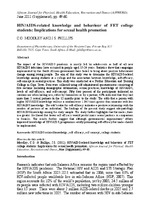HIV/AIDS-related knowledge and behaviour of FET college students: implications for sexual health promotion
Abstract
The impact of the HIV/AIDS pandemic is mostly felt by adolescents as half of all new HIV/AIDS infections have occurred in people aged 15-24 years. Statistics show that campaigns implemented by the South African government have failed to bring about positive behavioural change among young people. The aim of this study was to determine the HIV/AIDS-related knowledge among students at a college and the association between knowledge, self-efficacy, self-concept in sexual practices. This study was conducted at a Further Education and Training College in Cape Town. Data were collected using self-administered questionnaires consisting of five sections including demographic information; sexual practices; knowledge of HIV/AIDS, levels of self-efficacy; and self-concept. Fifty four percent of the participants indicated no condom use when having sex, either by themselves or by a partner; 43% indicated that they had more than 2 sexual partners in the 12 months prior to the study. The odds that a person with higher HIV/AIDS knowledge will use a condom were 1.047 times greater than someone with less HIV/AIDS knowledge. The odd’s ratio for self-efficacy indicates a positive relationship with the number of partners of an individual. The findings of the present study suggest adequate/high HIV/AIDS knowledge among the study sample. The study further highlights that for males, there is a greater likelihood that lower self-efficacy would predict more sexual partners in comparison to females. The results further suggest that although governmental organisations’ efforts improved knowledge of HIV/AIDS, programmes avidly promoting self-efficacy for males should be implemented.

